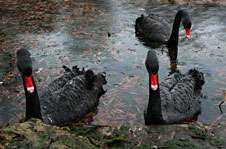Researchers prove existence of unique but ill-fated New Zealand black swan

New Zealand once had its own species of black swan but, like the moa, it was hunted to extinction soon after humans arrived in the late 13th century.
Researchers from the University of Otago, Canterbury Museum and the Museum of New Zealand-Te Papa Tongarewa now have proof that New Zealand's black swan – Poūwa (Cygnus sumnerensis) – was a unique species.
Analysis of ancient DNA and bone dimensions shows Poūwa were much heavier and larger than their Australian cousins, which are now common around New Zealand.
The researchers also found Poūwa were on the way to becomig flightless when they became extinct.
The lead author of the study just published in the Proceedings of the Royal Society B, Dr Nic Rawlence of Otago's Department of Zoology, says the Poūwa's build was more like a rugby player compared with the Australian swan's (Cygnus atratus) smaller and slender soccer-player physique.
Dr Rawlence, who is Director of the Otago Palaeogenetics Laboratory, says the team's findings are one of a "growing number of examples of extinction and colonisation since the arrival of people in New Zealand".
Australian black swans first arrived in New Zealand about one to two million years ago, during the Pleistocene Ice Age. On settling here and on the Chatham Islands they rapidly became bigger than their Australian cousins, weighing up to 10 kg compared with 6kg, and developing elongated legs and becoming more terrestrial in habitat.
"One of the interesting findings comes from the highly elongated leg bones, which shows they were already on the path towards flightlessness," Dr Rawlence says.
"Birds seem to get these elongated legs in island ecosystems where there are no mammalian predators and the top predators are birds, like the extinct Haast's Eagle and Eyles' Harrier.
"Prior to our study, it was thought that the extinction, by Polynesian/Māori hunting, and recolonisation of New Zealand by black swans was a unique example of extirpation-replacement by the same species since the arrival of people here.
"Until the mid-1990s, scientists thought that the black swans New Zealand had when Polynesians arrived were the same as the Australian ones we have now. But when Europeans arrived in New Zealand in the late 18th century there were no black swans, but they found their bones in pre-human fossil sites and archaeological deposits.
"We assessed museum and archaeological collections, and extracted ancient DNA in our laboratory, looked at bumps on bones and took bone measurements to characterise their shape," he says.
In the 1860s, Europeans introduced Australian black swans from Victoria.
"Within three or four years their population had grown and spread to the point that we suspect they must have been self-introduced as well.
"They'd probably been rocking up in New Zealand the whole time, but never been able to establish here until after the arrival of Europeans.
"We have shown now that the new Australian arrivals are not exactly replacements of the Poūwa. So this raises the question - what does it truly mean to be 'native'? Is the Australian black swan a pest or something to be protected?"
Dr Rawlence says New Zealand has a huge natural advantage in these palaeogenetic studies.
"As one of the last major land masses to be settled by humans, New Zealand has an excellent recent and well-preserved archaeological record, including for swans. We can separate out climate-change effects from change driven by humans.
"This research shows how the arrival of humans can rapidly change island ecosystems. It may also raise new questions when it comes to ecological restoration and, perhaps, even de-extinction.
"Our research shows that, in some cases, you cannot assume that closely related species are surrogates. The Poūwa's ecology might have been fundamentally different from that of the Australian black swan."
More information: Ancient DNA and morphometric analysis reveal extinction and replacement of New Zealand's unique black swans, Proceedings of the Royal Society B, rspb.royalsocietypublishing.or … .1098/rspb.2017.0876
Journal information: Proceedings of the Royal Society B
Provided by University of Otago


















